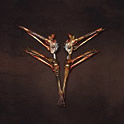 Part of the old guard of LA alternative metal, Fear Factory have been around since the early 90s. Their fortunes have risen and fallen over the last decade, but their relative longevity has added depths and nuances to their music. Part of the old guard of LA alternative metal, Fear Factory have been around since the early 90s. Their fortunes have risen and fallen over the last decade, but their relative longevity has added depths and nuances to their music.
Archetype looks back to the style of what was probably their most successful CD, Demanufacture, sidestepping the blind alley of 2001's critically mauled Digimortal. With bassist Christian Olde Wolbers taking over on guitar after the departure of Dino Cazares, and the addition of new bassist Byron Stroud, formerly of Strapping Young Lad, most fans will consider it a triumphant return to form.
Much of Archetype treads familiar ground; metallic keyboard sheen smashed into shards by demented jackhammer guitar, savage verse vocals segueing into smoothly melodic choruses drenched in double-tracked reverb.
But there are less expected resonances, too: The Cobain-influenced Human Shields is more grunge protest than industrial metal, flowing into a furious cover of Nirvana's School (from the Bleach album) by way of seven minutes of spacey synth-led instrumental. The triumphant title track nods towards a certain classic John Barry movie theme, and there are chord progressions which recall android-rocker Gary Numan, whose edgily paranoid anthem Cars the band covered back in '99.
Lyrically, this is an angry album. Lead single Cyberwaste lays into those who use the internet to parade their ignorance; Slave Labor is a vicious anti-music biz diatribe; Human Shields looks at the waste of life in the Iraq war. Archetype is a big, solid piece of work which will delight those who've been with the band from the start. Whether it will tempt younger fans away from their nu-metal formula mix is less certain. :: Clare O'Brien |
 Part of the old guard of LA alternative metal, Fear Factory have been around since the early 90s. Their fortunes have risen and fallen over the last decade, but their relative longevity has added depths and nuances to their music.
Part of the old guard of LA alternative metal, Fear Factory have been around since the early 90s. Their fortunes have risen and fallen over the last decade, but their relative longevity has added depths and nuances to their music.